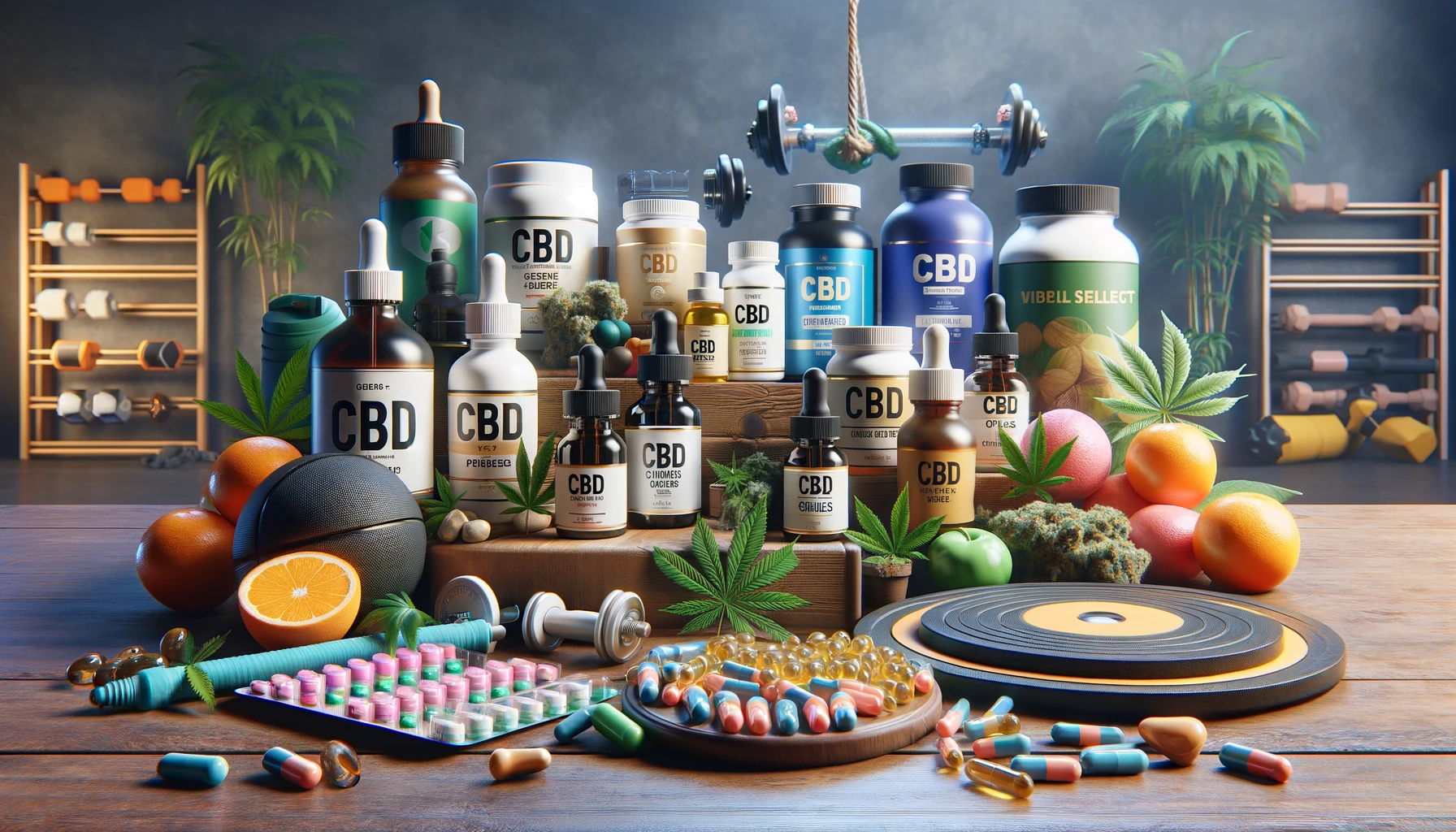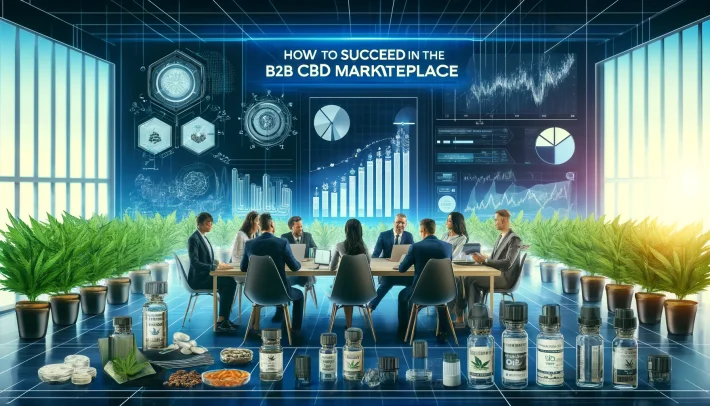Navigating the B2B (Business-to-Business) CBD marketplace can be a formidable challenge, yet it offers immense potential for growth and profitability. Positioned in the robust sector of wholesale CBD, businesses must adapt to the complexities of regulatory compliance, fluid market conditions, and evolving customer demands.
Based out of Davie, Florida, Sun State Hemp exemplifies success in this competitive arena. We are an industry leading manufacturer and distributor of premium CBD products. In today’s article, we’ll explores the crucial strategies for prospering in the B2B CBD market. We’ll shine a light on effective sales tactics, innovating in the marketplace, and staying on top of compliance. By the end, you’ll have a wealth of insights that will prepare you to succeed in the vibrant landscape of wholesale CBD.
Understanding the B2B CBD Marketplace
Let’s go over a quick crash course on what the B2B marketplace and how it works. The CBD market in particular is dynamic and rapidly growing sector. In the most basic sense, the role of each business works as such: manufacturers produce CBD products, wholesalers purchase and distribute them, and retailers sell them to the end consumer. This chain is vital for the smooth operation and scalability of CBD sales.
As a business, knowing where and how your CBD is sourced, processed, and distributed is critical. It ensures not only compliance with regulations but also the quality and consistency that B2B customers demand. Sun State Hemp, for instance, controls its supply chain closely, which significantly boosts our reliability and reputation in the market.
Creating Strong Business Relationships
Success in the B2B CBD marketplace is heavily reliant on building and maintaining strong relationships with business partners. Trust and dependability are paramount because B2B transactions are often larger in volume and value compared to business-to-consumer (B2C) transactions. A strong relationship can lead to repeat business, larger orders, and potentially exclusive contracts.
To forge these strong connections, it is crucial to communicate openly and regularly, deliver products consistently on time, and meet or exceed quality expectations. Businesses should also be flexible and accommodating to the unique needs of their buyers. Think about custom product formulations, or catering to specific packaging requirements. Similarly, providing excellent customer service, which includes efficient problem-solving and after-sales support, encourages ongoing business relationships.
Marketing Strategies for the B2B CBD Market
Effective marketing strategies in the B2B sector differ markedly from those applied in the B2C market. In B2B, the focus shifts towards education, professionalism, and data-driven discussions rather than emotional or impulsive buying triggers.
Content marketing, for example, is a powerful tool in the B2B CBD marketplace. Publishing articles, white papers, and case studies that detail the benefits and uses of CBD products can attract the attention of business buyers. These materials should highlight research and industry analysis – the kind of in-depth research that a business buyer can use to justify the purchase decision, especially if there are other stakeholders or upper management.
Additionally, attending industry conferences and trade shows is a vital marketing strategy for B2B CBD companies. These events provide opportunities to network, build relationships, present products, and even close deals. They also offer a chance to stay updated with industry trends and regulations, which is crucial information for all market participants.
Regulatory Compliance and its Importance
Navigating the regulatory landscape is arguably one of the most challenging aspects of the B2B CBD marketplace. The legal status of CBD can vary significantly from one jurisdiction to another, affecting how products can be marketed and sold.
To succeed, businesses must ensure strict compliance with all local, state, and federal regulations. This involves regular monitoring of legislation changes and adapting business operations accordingly. For example, ensuring that all products sold have the correct labels (including on shipping), meet the THC content restrictions, and, where applicable, have the necessary licenses or certifications. Crucially, third-party lab testing is required for CBD products. Manufacturers, distributors, and retailers alike should ensure their products contain verifiable, freely-accessible lab reports.
Compliance not only prevents legal issues and potential fines but also builds credibility and trustworthiness in the marketplace. Business buyers are more likely to engage with a supplier that consistently demonstrates a commitment to compliance, as this reduces their risk of facing legal challenges from the products they purchase.
Innovation and Product Development
Staying competitive in the B2B CBD market necessitates continual innovation and product development. As the marketplace grows, so does the products’ sophistication. Businesses that routinely innovate—whether through new product lines, improved product formulations, or advanced manufacturing processes—can capture a larger share of the market.
Listening to customer feedback and staying tuned to market trends can guide innovation efforts. For instance, if there is a rising demand for CBD-infused beverages, a manufacturer might consider developing a new line of drinkable CBD products. Alternatively, if consumers are increasingly seeking organic products, a company might transition to using organically grown hemp.
Furthermore, investing in technology can also yield substantial benefits. Advanced extraction techniques, for example, can improve the purity and potency of CBD products, making them more desirable to businesses looking to offer the best quality products to their customers.

Education and the Role It Plays
Educating potential clients about the benefits and applications of CBD is essential in the B2B marketplace. Since the legal landscape around CBD is complex and still evolving, businesses partaking in this market need to be well-informed to make sound decisions.
Providing educational resources and training not only helps in building trust but also empowers customers to promote your products more effectively. For instance, if a retailer understands the various benefits and distinctions of CBD products, they are better equipped to communicate this to the end consumer, potentially increasing sales volumes.
As you can see, the B2B CBD marketplace offers tremendous opportunities for growth, but it requires a strategic approach. From understanding the supply chain and nurturing business relationships to staying on top of regulatory changes and investing in continuous product innovation, every aspect needs thoughtful consideration and execution. Companies that can excel in these areas are well-positioned to succeed in this industry.
Seizing Opportunities in the B2B CBD Market
As we navigate the complexities and capitalize on the opportunities within the B2B CBD marketplace, it’s clear that strategic planning, strong relationships, and a commitment to compliance play pivotal roles. For businesses eager to carve out a significant presence in this dynamic field, partnering with a seasoned manufacturer and distributor like Sun State Hemp offers a distinct advantage. Our experience and dedication to quality ensure that you receive products that comply with stringent regulations and surpass market expectations.
Take your business to the next level in the B2B CBD market with Sun State Hemp. Explore our diverse range of premium CBD products and benefit from our expertise and support at every step. Visit us at Sun State Hemp to find out how our wholesale opportunities can help grow your business today. Let’s grow together in the thriving CBD industry.

